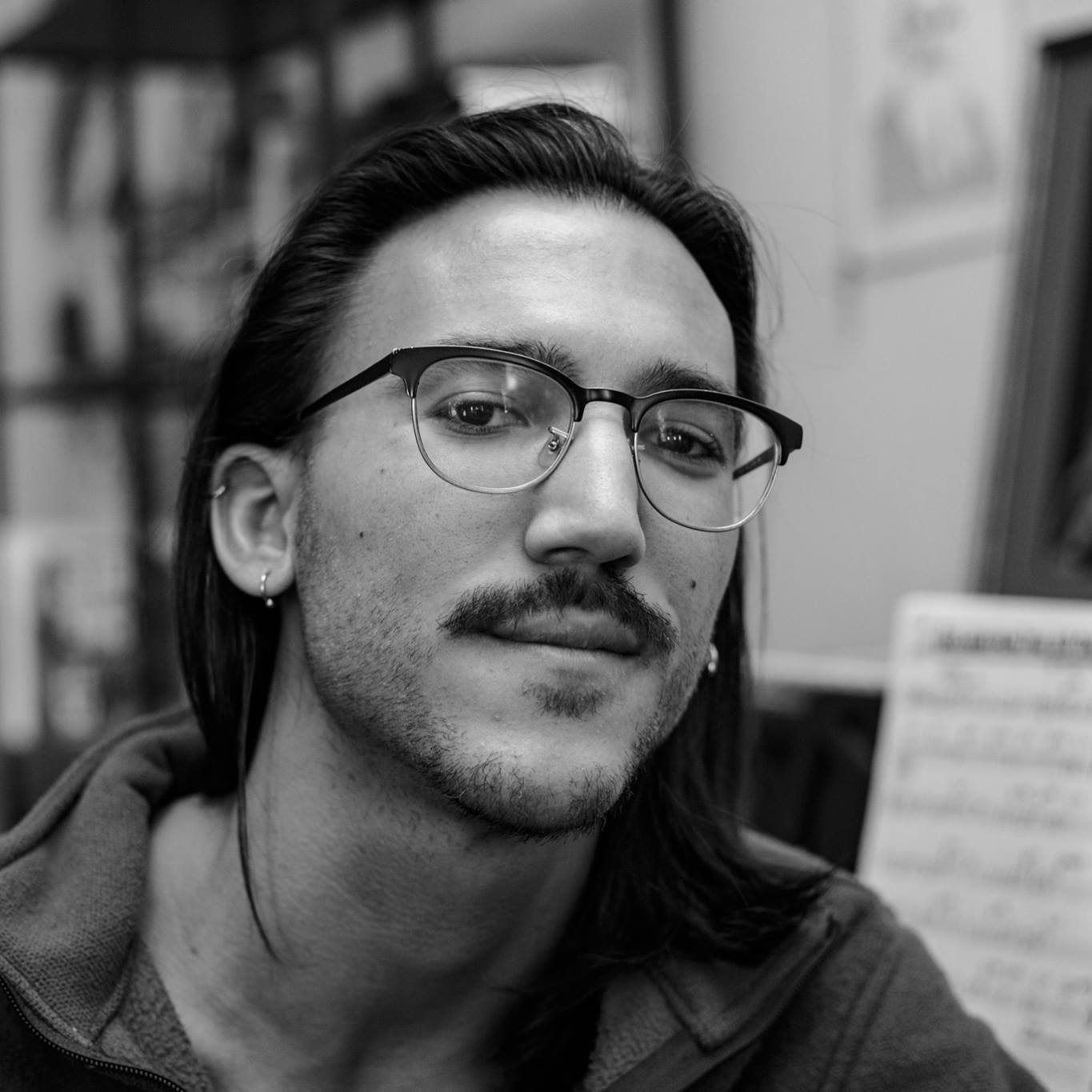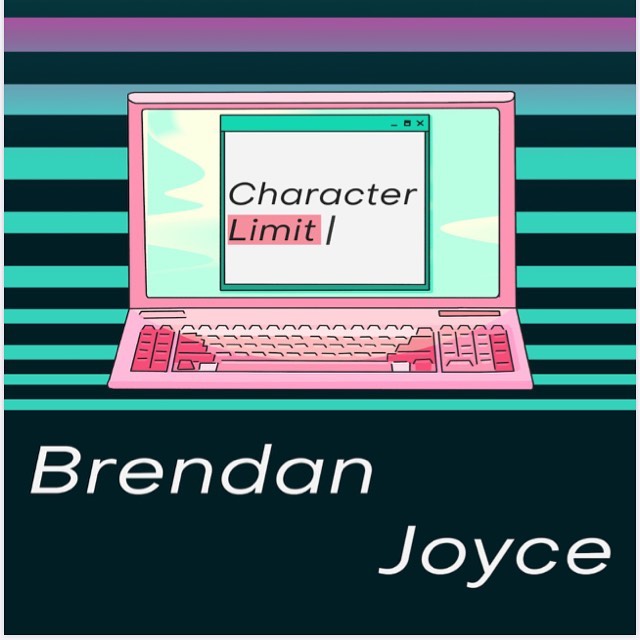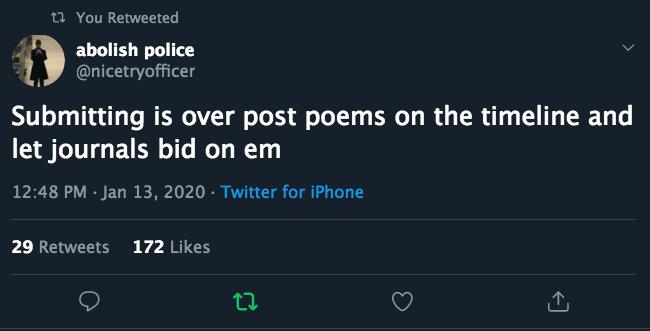ISSN: 1941-4137
POETRY THAT ENACTS THE ARTISTIC AND CREATIVE PURITY OF GLASS
POETRY THAT ENACTS THE ARTISTIC AND CREATIVE PURITY OF GLASS

Constantine Jones is a Greek-American thingmaker raised in Tennessee & currently housed in Brooklyn. They are a member of the Visual AIDS Artist+ Registry & teach creative writing at The City College of New York. They also volunteer in the LGBT Center Archives, where they conduct research on queer Greek-American histories as they intersect with HIV. Their work has been performed or exhibited at various venues across NYC & their debut hybrid haunted house book, In Still Rooms, is out now via The Operating System.
March 24, 2020
Edited by Stephanie Kaylor
Edited by Stephanie Kaylor
Revolution Like Summer: Review of Character Limit by Brendan Joyce
 Character Limit
by Brendan Joyce
Luna, 2019
Character Limit
by Brendan Joyce
Luna, 2019Copyrights are for cops
write these poems wherever
From the very first words encountered in Brendan Joyce’s digital chapbook Character Limit (Luna, 2019), the whole project seems to show its heart. The collection contains 67 poems composed within the 280 Twitter character limit & shared on Joyce’s platform (@nicetryofficer) shortly after being written. In structure alone, this body of work plants its feet immovably in explicit & determined opposition to the supposed authority & sanctity of the publishing industry as we know it. This book is one of many necessary acts of digital defiance on the web right now — more independently run online platforms have been cropping up across Twitter than I’ve ever seen (just look at Neutral Spaces, Taco Bell Quarterly, The Living Journal etc.). But let me be fully clear: Character Limit is so much more than how it exists. It’s an important, necessary collection because of the heart it contains, down to every last character.
With no intention of being reductive, but in the spirit of “writing these poems wherever,” there is one in particular that might stand as a blueprint for the entire collection:
17.
I know the riot isn't coming
because the Boss says a
riot is coming. The revolt
ghosts us, can't hear it
over the sprawl. The city
is occupied by convention.
The jersey barrier sets the
scene: "this is what a polic
state looks like." It becomes
an Instabram installation.
So many bones are exposed in these mere 272 characters: distrust of those in positions of authority, the ache for radical / actual change, references both literary (William Gibson’s iconic “Sprawl Trilogy”) & pop culturally (being ghosted, the conflation of Instagram posts & institutional art etc.). These are themes which drift like smog through the late-capitalist wreckages of these poems’ landscapes.
Character Limit catalogues what I can only describe as recognizable ruins. School supply lines, childhood cafeterias, freight turbines, neighborhood blocks & church basements etc. This sprawling “Sewer main under god’s house,” as evoked in no. 13. There is no exaggeration here. These are familiar spaces for any among us who’ve weathered & been weathered by the exploitative cycles of office labor or the food service industry, the expectations of obtaining a college degree & burdens of student loan debt, or simply (is it really that simple? was it ever?) staying alive each day with a positive number in the bank account.
In poem no. 63 Joyce writes, “Jobs are our only country, / let the politicians / tell it.” Two pages earlier, no. 61 begins, “The only hours in a day / are the ones you’re / clocked in.” And yet even amidst this bleak reality, there is the acknowledgement that warmth is there in the world too, if only we could (or would let ourselves) notice it. No. 61 continues: “We talk about / years like there weren’t / enough flowers in them.” Because, of course, there were. There are. This dichotomy, more than anything, is what solidifies Character Limit for me as something both urgent & tender. These poems do not stop at simply highlighting the injustices of late capitalism or the repercussions implicit in trying to survive its aftermath — they offer a frenetic kind of empathy, an almost maddening outcry for care. Riot! Organize! Gather together & give a few fucks, please! these poems all but scream. There is no resignation here. No. You would never be so angry if you didn’t care so much.
I first learned of Joyce on Twitter, when the algorithm let me know that 3 of my mutuals were following him. This was the tweet:

I instantly appreciated this (as I read it) very sincere call to action for poets to take a first step at bypassing the heavily guarded gates of capital “L” Literature. It all begins with small but significant acts of sidestepping the supposed authority figures — of saying, I don’t need your validation because look, here’s the work, I’m doing it anyway. Did I come for the poetry & stay for the communism, or both, who can say. Or maybe they’re one in the same. Regardless, Joyce’s tweets are just as much a part of Character Limit as the poems it contains. That’s part of the project — it’s always happening, right now, in real time, wherever you are. Because the thing about change is it can only occur in the present tense. By the time you read this, surely, the project will have already continued to re-begin.
In the Acknowledgements Page, Joyce offers thanks to Cleveland “for being a byzantinne hellscape.” This too, I believe, is sincere. The City in Character Limit is both specific & sprawling. The City is dangerous, complicit in the violence we perform & yet it’s just as threatened by our behavior as we are by its shaded corners. No. 54 begins, “Three teens abducted / a block from one another a / year from one another, / sequentially. I write an elegy / for bicycles.” Yet in the poem immediately following, we watch as “The all night diner / with three gunshot wounds / at the register & three / crooked landscape paintings / takes off its own awning.” These spaces seem just as eager to escape us as Joyce’s speakers are to make it up & out unscathed. In this version of the City “the / swing set where / I bit through / my lip (gets) paved / for elite parking.” Sites like these permeate Character Limit — where the past is not so much completely dissolved as suffocated by some other new material waiting, in its own way, to be replaced.
On Jan. 15, Joyce tweeted one of many “draft poems” he’s been posting over the past few months — an extension of the poem-as-life-in-realtime spirit so inherent in his work. It stopped me cold & it goes like this:
Last night i watched
the haze of heavy lavender
Lorain Avenue set itself
on fire. It tattooed
broad daylight on its
forehead & turned to
me & asked for a bus
pass, still on fire.
When I say I'm from hell
I just mean I'm with you
wherever you are.
Here is a town / a city / a livingspace always under the strain of its own self. Can the bus ever really take us up & out of here, the poem seems to ask, or is there anywhere else to go. Is it all the same fire, the same burning. Maybe so. But still there is some comfort in knowing that, even in hell, a togetherness can be possible. It must be.
Joyce has launched a Patreon page where you can view drafts-in-progress & other exclusive content.
Visit Brendan Joyce's Website
Visit Luna's Website
Glass: A Journal of Poetry is published monthly by Glass Poetry Press.
All contents © the author.
All contents © the author.





